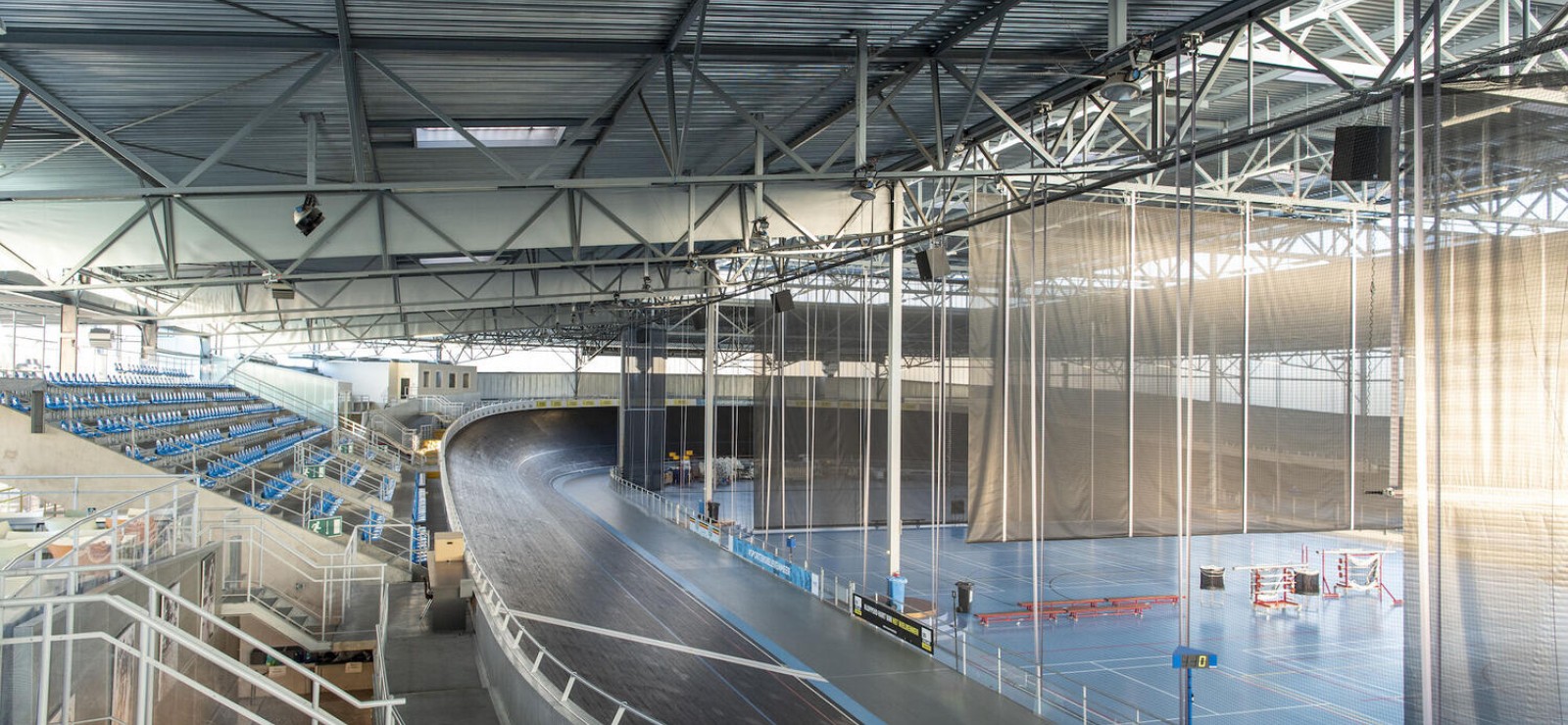If the Belgian track cyclists win a medal at the upcoming Olympic Games, it will not only be the result of top performances but also of top research. In the Flemish Cycling Centre Eddy Merckx, a stone's throw from the Watersportbaan, a group of researchers from the IDLab of UGent-imec supports our track cyclists with the help of artificial intelligence (AI).
In short
- Ghent University researchers have developed a system to collect and analyze all relevant data from the field using AI
- The speed of analysis allows the coaches to make adjustments immediately, to instantly improve the performance of the riders
- Expansion to other sports is only a matter of time
Professor Steven Verstockt leads the Sports Data Science team, as the research group is called, in the right direction. As an inveterate amateur cyclist, he eagerly looks forward to the Olympics and the performances of the Belgians, in which he also has a part.
Steven, your Sports Data Science team has been working for years to use technology to make the track riders of Cycling Vlaanderen and Belgian Cycling better?
Steven Verstockt: "Yes, a few years ago we built the Wireless Cycling Network (WCN) on the practice track for track cyclists of the Eddy Merckx Centre, a permanent set-up that we are constantly working on to improve the performance of athletes."
How does that work exactly?
"The track is surrounded by receivers that record and measure all the data of each cyclist; the cyclists themselves are not burdened with additional equipment. They only wear their classic heart rate monitor and on their bikes are the average power and cadence meters.
We don't even need access to their personal bike computers, but harvest all the sensor data about power, rhythm, and heart rate while the cyclists give it their all on the track. These data are processed at lightning speed, analyzed with AI, and continuously forwarded to the coaches so that they can make very targeted adjustments.
With the help of the video images, the driving style is also scrutinized. These results are so positive that we will also integrate this aspect into the permanent setup."
The coaches are already directing the riders while they are still working?
"Track cycling involves minor adjustments that can have major consequences. An important discipline is the team pursuit. Four riders have to cover a certain distance as fast as possible in a team, with the riders relieving each other at the head of the train.
The speed and quality of those substitutions are decisive for the result. The more efficient and smoother, the better. The WCN records all rider changes to review them. Our AI model determines in the blink of an eye: this switch was good, this one was bad. Thanks to the WCN, we are refining the technique of track cycling, such as the timing and height of the switches."
Is the collection of all that data limited to that application, or are there still possibilities?
"Our platform is also open to other research groups, such as the movement scientists led by Professor Jan Boone. They conduct research into energy during cycling. With their Pace model, they calculate how a top cyclist best doses energy. In combination with our setup, they can then use a battery to visualize how much is left in each rider's tank. On a screen, they can then see their battery drain slowly and in a controlled manner."
So with the help of technology, you determine how our riders can perform optimally on the Olympic track?
"Exactly. Our project came about at the request of the trainers. In many sports, wearables, such as smartwatches and heart rate monitors, are becoming increasingly important. But with the management of all the data they provide, many trainers and sports federations don't know what to do. Coaches lose valuable time cutting up, combining, and editing that abundance of information. That's where we come in. I refer again to the substitutions at the team pursuit. Until about six months ago, the analysis was still a chore for the coaches. They put a lot of time into it and were never able to make adjustments during the training itself, but only a few days later. And they had to look for the accompanying video footage. By linking our sensor data to the video images, they also have all that available in the blink of an eye."

Steven Verstockt: "AI alone doesn't help a top cyclist ride better; It's always a mix of fitness, coaching, and technology. Fears that AI will soon take over just about everything are totally unfounded."
Can you also use the WCN on the slopes in Paris?
"The only technological tool in Paris is the official video footage of the matches. We can analyze them afterward, but we don't have access to the Olympic cycling track.
The more we use our technology during training, the better our cyclists perform and the smarter our AI becomes. This is not to say that everything AI suggests is sacred. Because it's always the coach who decides."
So the coach is allowed to fight with artificial intelligence?
"AI alone doesn't help a top cyclist ride better; It's always a mix of fitness, coaching, and technology. Fears that AI will soon take over just about everything are totally unfounded. In track cycling, the WCN is additional support for the coach. Where he used to only have a stopwatch, he now has AI as an extra tool. He still decides autonomously what to do with that information. AI does take work off his hands, which saves him time that he can invest in guiding his athletes."
Is there potential for WCN technology in other sports as well?
"We are investigating the possibilities for skating. With short-track and long-track speed skating, we find ourselves on a track, just like in track cycling. We are also looking at athletics and have already carried out a number of tests in collaboration with IFAM, the organizer of athletics competitions in Flanders.
Our research group is also a permanent 'data partner' of the International Cycling Union UCI. We collect and analyze all data on the safety of professional road cycling. We describe and investigate incidents, and hope to gain more insight into what went wrong. The intention is to make all courses even safer in the future."
Have you tested the WCN yourself as an amateur cyclist?
"Yes, but track cycling is quite a challenge. Because such a bike has no brakes. (laughs) That takes some getting used to. We always test the basics ourselves, which means that we also have to climb that steep slope now and then. I've never fallen on the track, although I'm still cautious, because it's an extraordinary discipline. It's much more technical than road cycling."
Has a ladder ever been used to save you from the slopes, like the hilarious sketch from 'In the Gloria'?
"Fantastic video, but fortunately nothing like this has ever happened to me. (laughs)"
Read also
Ghent University professor collaborated remarkable opening ceremony of Olympic Games: "The pressure was on"
No traditional opening for the Olympic Games in Paris, but a spectacular fleet of 95 boats on the Seine with 10,500 athletes on board. It was a historic moment and a technical feat. The research group of Evert Lataire, Ghent University professor of Ships and Marine Technology, trained the captains for this unique boat parade.
Alumnus Inge Bru coaches Paralympic athletes in Paris: "It's going to be intense!"
Good news for sports fanatics, the summer of sports is not over yet! Our Belgian athletes will soon be competing at the Paralympic Games. Alumna Inge Bru, specialist in physical medicine and rehabilitation at Ghent University Hospital, accompanies them in Paris.
Ghent-based DoCoLab helps to control doping at the Olympic Games
The doping controls at the upcoming Olympic and Paralympic Games will again have a Ghent connection. The doping control lab of Ghent University, DoCoLab for short, is sending a team of researchers to Paris to help check many thousands of samples. Peter Van Eenoo, head of the lab, professor and cycling fan, will be part of that team: "We won't have lots of free time, but I do hope to catch some of the cycling (laughs)."
New field hockey ball saves thousands of litres of water per game
Professional hockey fields require extensive wetting. Millions of litres of water are used annually to irrigate one field, making the sport expensive, unsustainable and inaccessible. That's why the international field hockey federation FIH aims to switch to dry fields as soon as possible.




